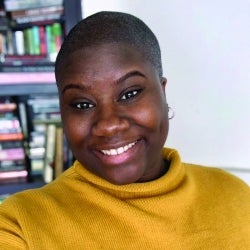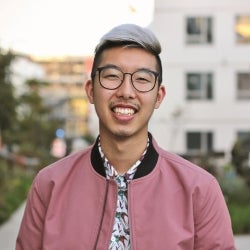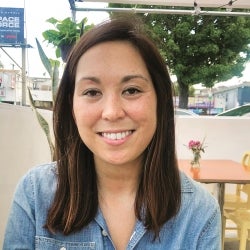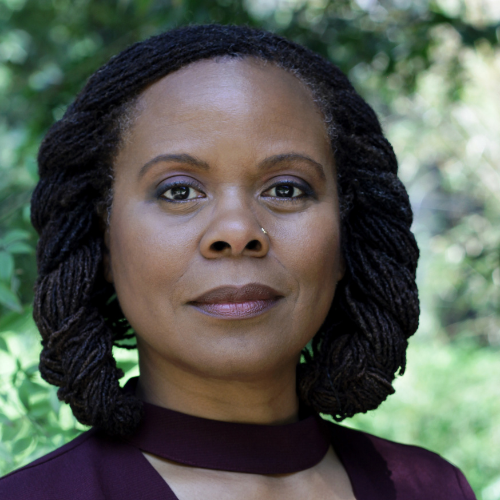Pursuing Justice
Six Fielding School students who are active members of FSPH's Center for the Study of Racism, Social Justice & Health discuss what motivates their academic work and how they hope to make a difference.

Natalie Bradford, MS, PhD Student
WHEN I WAS IN HIGH SCHOOL, my family and I moved a dozen times. The series of moves escalated after my younger sister was hit by a car. Many of the rehabilitation services she needed were not available in our neighborhood. At the time, I did not understand why. Why do predominantly Black neighborhoods tend to lack access to quality and affordable health care? To understand this question and contribute to the scholarship and organizing that can challenge its reality, I study structural racism’s relationship to health policy and health care inequities.

As a graduate student researcher at the Center for the Study of Racism, Social Justice & Health, I contributed to and served as the project manager for the recently published book “Racism: Science & Tools for the Public Health Professional.” The book — drawing on decades of public health research, practice, and activism — makes it clear that racism is a public health issue that is neither new nor an aberration from the past. In one of the book’s appendices, I describe three community-based anti-racism projects. Each project includes policy change as a strategy to address racism and advance health equity.
One of my goals is to demonstrate that racism is not only a public health issue; it is also a health care and health policy issue. With an eye toward that goal, my dissertation uses critical race theory to examine the relationship between racial residential segregation and the expansion of community health centers under the Affordable Care Act.
Millicent N. Robinson, PhD Student
HEALTH HAS ALWAYS BEEN A PASSION OF MINE particularly mental health among Black women. This commitment was born from witnessing the impact of stress-related chronic health conditions among women in my family. I obtained training in psychology to understand mental health more broadly. Subsequently, I completed training in social work and public health to understand the connections between mental and physical health.

Black women experience unfavorable physical and mental health outcomes due to racism, sexism, classism, and other factors. Additionally, dominant conceptualizations of health within the U.S. are Eurocentric, and typically do not consider the experiences and perspectives of Black women. To address this, my work examines the links between chronic stress, racism, coping, and health, while centering the experiences of Black women. Public health has provided me with the tools to explore these relationships from a population-based perspective.
I now serve as coordinator of the Center for the Study of Racism, Social Justice & Health. I chaired the 2020 UCLA Minority Health Conference that was hosted by the center in February. I am grateful to have been provided an opportunity to lead in facilitating a space that not only highlighted, but also honored, the work, perspectives, and contributions of community members. Many members of the conference planning committee are student affiliates of the center. To be surrounded by peers who also work to disrupt oppressive systems and dismantle structural inequities has been transformative.
Taylor B. Rogers, MPH, PhD Student
SHORTLY AFTER STARTING MY FIRST JOB in human services and behavioral health for Baltimore County, I grew frustrated that my training, skill set, and work scope were limited to individual behavior change and ignored the ways in which oppressive systems and structures such as racism operate in the background and hinder the ability for Black people to live their best, most productive, and fulfilling lives. This led me to pursue my MPH in Health Equity from the University of Maryland, College Park, and begin my PhD in Health Policy and Management at the Fielding School.

The ways health researchers, health care practitioners, and frontline staff are trained reflects structural forms of racism. I hope to raise racial consciousness among these groups to improve health and health care outcomes for Black people and other marginalized communities to achieve health equity. Additionally, I want to mentor the next generation of researchers, especially scholars of color, to continue the work toward dismantling oppressive systems, which I plan to do as a graduate of this doctoral program.
The UCLA Center for the Study of Racism, Social Justice & Health has been my intellectual home since I began my doctorate in the fall of 2018. Under Dr. Chandra Ford’s mentorship, I chaired the Planning Committee for the Minority Health Conference at UCLA in 2019 and was the past-chair of the committee in 2020. I have also served as a consultant for Black Coalition Fighting Back Serial Murders.
Working with Dr. Ford and the center provides a regular reminder that I and other student affiliates belong in this space, and that our expertise is needed — especially now, in the middle of the COVID-19 and racism pandemics.
James Huynh, MA, MPH '19, PhD Student
IN COLLEGE, I WANTED TO PURSUE MEDICINE to become a neurosurgeon and find a cure for Parkinson’s disease — the disease that had taken my paternal grandfather from me. But taking ethnic studies courses and being involved with student organizing for workers’ and immigrants’ rights changed my trajectory. In particular, learning from the radical activism of queer communities of color in California helped me find a sense of purpose and belonging in committing to a life of transformative justice.

In my pivot to public health, I study how processes of racial capitalism (i.e., the racialized extraction of people, labor, resources, and land) and heterosexist patriarchy affect queer communities of color. I also study how these communities foster cultures of health in their kinship-making practices and grassroots organizing. By using a community-based participatory research approach, I seek to help queer communities of color address structural forms of social, political, and economic precarity.
At the Center for the Study of Racism, Social Justice & Health, I was previously the interim center coordinator, and am now the coordinator for our COVID-19 Task Force on Racism & Equity. In these roles, I feel immense privilege to work with an interdisciplinary team of scholar-activists who approach public health with critical anti-oppression perspectives.
Anna Hing, MPH, PhD Candidate
AS AN UNDERGRADUATE I studied psychology and anthropology, which prompted me to think about the health consequences of interpersonal discrimination and structural violence. I became most interested in how structural inequality led to health inequities, and began thinking about the role of structural racism. I then chose to pursue a master’s, and subsequent doctorate, in public health because I appreciated how the field applied theories from across disciplines to address racial health inequities. My specific interest is in examining how understudied forms of structural racism, such as voter suppression, produce racial health disparities.

With the center, I’ve become involved with the COVID-19 Task Force on Racism & Equity. While this task force began with a focus on the pandemic, it has shifted to also address the ongoing crisis of police brutality. My role has been to contact policymakers to help them think about anti-racist solutions to these two pandemics. COVID-19 has disproportionately harmed Black and Brown people, and the center is actively calling attention to these inequities and working to create solutions to mitigate their increased vulnerability.
As I study the impact of policies, such as voting, that might at first glance seem unrelated to health, it has been incredibly rewarding to see how the center has worked with policymakers and practitioners to demonstrate how these decisions directly influence the health of some of the most vulnerable California residents. In the future, I hope to use the skills developed from this experience to continue to bridge public health research and practice to move toward health equity.
Ezinne Nwankwo, MPH, PhD Student
MY CHILDHOOD IN LAGOS, NIGERIA and my family’s immigration to San Francisco served as the catalyst I needed to ask bold questions. Our move from familiar hardships to new challenges revealed that oppression and the fight for justice are globally linked. This discovery sparked my interest in connecting the social and economic conditions in which we grow up and live to health.

These realizations began as reflections about my family’s experiences, but when I took a course on structural inequities and public health as an undergraduate at San Francisco State University, I began to tie the unfair distribution of opportunities, resources, and political power to inequities in health. My interest in the study of racism and health allows me to focus on how structural determinants, which are often assumed to be too removed to have measurable impacts, shape our health and well-being.
My work at the Center for the Study of Racism, Social Justice & Health focuses on identifying funding opportunities for various projects and working with Dr. Chandra Ford and her colleagues to develop and submit the proposals. I find this work meaningful because it will establish continuity in the center’s anti-racism efforts and ensure that future students have access to the center for years to come.
In the long term, I envision a career in which research, community engagement, and policy play a central role. For me, this can take many different forms, but a future that foregrounds anti-racism work is paramount.
